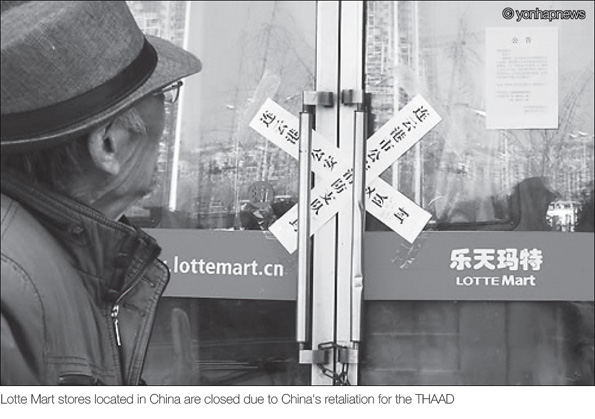
Myeongdong, which used to be full of Chinese tourists, has been empty, and many tour buses carrying Chinese tourists have disappeared. In addition, duty-free shops that were crowded with Chinese tourists before THAAD have been so silent that it seems strange. On March 2nd, due to the so-called “geumhallyeong” where the Chinese government imposed bans on the sale of Korean travel products, Chinese tourists called ‘youkeo’ have disappeared in Seoul. It is China’s retaliation for the THAAD deployment in Korea.
Recently, various industries in Korea have been damaged because of China’s economic retaliation for the THAAD deployment in Korea. The most damaged part is the travel industry. In fact, Chinese people have not been able to purchase Korean travel products or airline tickets online or offline since the incident occurred because they have been banned from doing so. The problem of the decreased sales in many stores located in Seoul, such as ‘Dongdaemun’ and ‘Myeongdong’, where a lot of Chinese tourists visit, has been serious. In some of the stores, sales have decreased by 90%. In particular, in the case of the duty-free shops of the eight major corporations, sales have decreased by 30%, and considering that most of those customers are typically Chinese, it is likely to cause more severe damage to those kinds of shops. The damage to small duty-free shops, which are usually located in the countryside, is more serious than the shops located in capital areas because small duty-free shops are more dependent on Chinese tourists than the shops in the capital areas.
Lotte Corporation, a Japanese company, has been damaged the most because they provided the government with the Sungju land for the site of THAAD. Lotte Mart stores in China have suffered from China’s ruthless action since March 20th. Among them, 73 Lotte Mart stores in China have been ordered to suspend business because of insufficient precautions for preventing fire, and 13 stores have been temporarily closed by demonstrations in front of the stores.
Many Chinese in Korea are so worried about the situation. Eun Yo-ham (’17, Dept. of Korean Language and Literature), who is a CBNU Chinese foreign exchange student, anxiously said, “My parents and friends in China started to worry about me after the news of the THAAD deployment, so they asked me to come back to China.”
The reason why China has opposed the THAAD deployment is that the radar can observe the missile test facility of China. However, the United States said that the radar has no capacity to detect it. The real reason for China’s opposition to the THAAD deployment is that the THAAD’s radar can lower China’s ability to counterattack because the United States can determine whether China’s missiles are genuine or not through the radar.
On a TV program called ‘Sseoljeon’, Rhyu Si-min, a politician, raised some questions: “Is THAAD deployment really needed for national security? Is it worth the conflict with China?” In addition, regarding the incident, he said, “THAAD can’t protect Seoul from North Korea’s nuclear weapon and missiles, and the government should’ve considered it in terms of diplomacy, economy and the military.”
The Korean government’s measures for the Chinese retaliation are totally inadequate. China’s retaliation against THAAD was already anticipated when talking about whether to deploy THAAD in Korea or not. However, the Korean government has not introduced distinct measures yet, which has resulted in serious damage to Korea. Even though the Ministry of Trade, Industry and Energy has provided some companies with assistance by financing 400 billion won and by creating the Special Trade Damage Support Team, it has not been enough to deal with the problem. In addition, each municipality has been looking for ways of supporting small businessmen who have been damaged by decreased sales from the loss of Chinese tourists.
By Lim Su-jin
sj38@cbnu.ac.kr


 All
All Experience
Experience






 Lim Su-jin
Lim Su-jin











